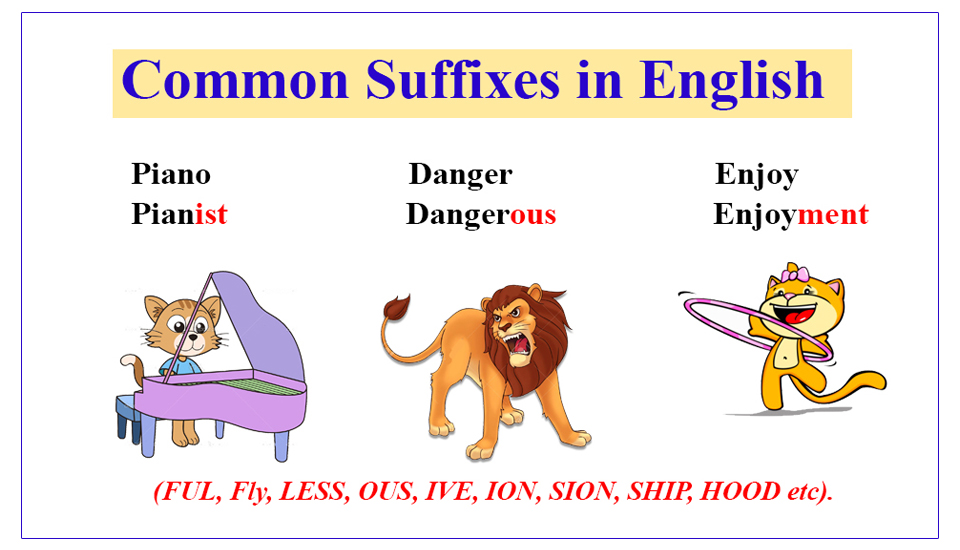Learning something about common suffixes in English language can help you improve general reading comprehension; suffixes help you use context and etymological clues to make educated guesses about the meaning of unfamiliar words. Moreover, to build your vocabulary power you should learn about common suffixes in English. For instance, the word is ‘beauty’ the form is noun, why not learn other forms with suffixes, like: beautiful (adjective), beautify (verb), and beautifully (adverb) now you have learned four new words. In the article below you will learn common suffixes in English which will help you improve general reading comprehension and vocabulary power.

Common Suffixes in English
A suffix is a letter or group of letters added at the end of a word to make a new word. A suffix can make a new word in one of two ways:
1. Inflectional (grammatical)
In this case the basic meaning of the word does not change after putting the suffix. For instance, changing singular noun into plural or present tense to past tense.
- Cook = Cooked
- Cat = Cats
2. Derivational
In this case the new word has new meaning “derived” from the original word. But the new meaning is related to the old meaning.
- Clean = Cleaner
Care = Careless
Spelling Suffixes
Often suffix causes a spelling change to the original word. In the examples below the suffixes change the part of speech or meaning of the original words. But remember these are generalizations only, and you will find exceptions to many of them.
1. Common Noun suffixes
–ER
It is used for the person who does an activity, and can be used with a wide range of verbs to change them into nouns.
- Write = writer
- Paint = painter
- Work = worker
- Teach = teacher
–OR
Sometimes the (-er) suffix is written as (-OR) but the pronunciation is the same.
- Act = actor
- Operate = Operator,
- Sail = sailor
- Supervise = supervisor
–EE
It can be used for the person or thing that receives or experiences the action, where (-ER) is used for the person who does an action.
- Employ = employer / employee
- Address = addressee
- Pay = payee
–TION, -SION, -ION
They are used to make nouns from verbs.
- Complicate = complication
- Pollute = pollution
- Donate = donation
- Admit = admission
_IST
It can be used for person meaning one who or that which and changes verb to noun.
- Piano = pianist
- Journal = journalist
- Type = typist
- Buddha = Buddhist
-ISM
It can be used for people’s politics, believes and ideologies and sometimes their professions.
- Buddhism
- Journalism
- Communism
–NESS
It is used to make nouns from adjectives and shows state.
- Careless = carelessness
- Useless = uselessness
- Weak = weakness
2. Adjective Suffixes
–ABLE/ -IBLE
These suffixes are used to make adjectives from verb and it means able or can do.
- Drink = drinkable
- Wash = washable
- Flex = flexible
- Agree = agreeable
3. Verb Suffixes
-ISE/ -IZE
These suffixes are used to make verbs from adjectives.
- Modern = modernize
- Commercial = commercialize
- Industrial = industrialize
Other Common Suffixes in English
– MENT: it is used at the end of noun and changes verb into noun.
- Excite = excitement
- Enjoy = enjoyment
- Refresh = refreshment
-ITY/ -TY: Noun derived from adjective and shows state of or quality.
- Captive = Captivity
- Clear = Clarity
- Secure = Security
-HOOD: Abstract nouns or family terms.
- Childhood
- Motherhood
- Brotherhood
-SHIP: Abstract nouns, but status.
- Friendship
- Partnership
- Membership
-IVE: Adjective or noun derived from noun.
- Product = Productive
- Act = Active
- Abuse = Abusive
-AL: Adjective derived from a verb or a noun meaning relating to.
- Nature = natural
- Brute = brutal
- Nation = National
-OUS: Adjective derived from a noun or a verb.
- Danger = dangerous
- Continue = continuous
-FUL: Adjective derived from a noun or a verb meaning full of.
- Forget = forgetful
- Hope = hopeful
- Use = useful
-LESS: Adjective derived from a noun or a verb meaning without.
- Use = useless
- Worth = worthless
- Mind = mindless
-IFY: Verb derived from an adjective or noun.
- Beauty = beautify
- Pure = purify
